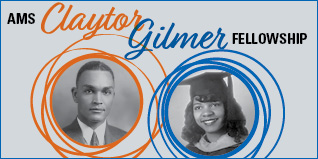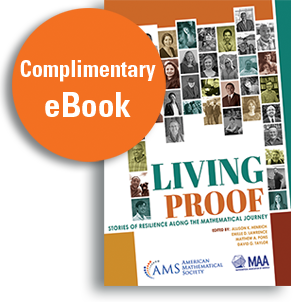

Spotlight on:
The AMS Claytor Gilmer Fellowship
 Named after Dr. William S. Claytor and Dr. Gloria Ford Gilmer, this fellowship aims to further excellence in mathematics and to help generate wider and sustained participation by Black mathematicians at the highest levels of research. It carries an award of $50,000 and is typically conferred on one individual per year. Read more . . .
Named after Dr. William S. Claytor and Dr. Gloria Ford Gilmer, this fellowship aims to further excellence in mathematics and to help generate wider and sustained participation by Black mathematicians at the highest levels of research. It carries an award of $50,000 and is typically conferred on one individual per year. Read more . . .
The American Mathematical Society recognizes the breadth of people, thought, and experience that contribute to mathematics. We value the contributions of all members of our mathematics community to improve mathematics research, education, and the standing of the mathematical sciences. We welcome everyone interested in mathematics as we work to build a community that is diverse, respectful, accessible, and inclusive. As the largest math organization in North America, the AMS is committed to using our reach and resources to generate equitable opportunities for people regardless of gender, gender identity or expression, race, color, national or ethnic origin, religion or religious belief, age, marital status, sexual orientation, disabilities, veteran status, immigration status, or any other social or physical component of their identity.
Free AMS Resources
 Living Proof: Stories of Resilience Along the Mathematical Journey, is a free e-book and shares stories of struggles and strength so they can become a part of someone else’s story of resilience.
Living Proof: Stories of Resilience Along the Mathematical Journey, is a free e-book and shares stories of struggles and strength so they can become a part of someone else’s story of resilience.
The AMS creates posters that celebrate the achievements of a diverse group of mathematicians. These posters are free and available upon request
AMS Award for Mathematics Programs that Make a Difference
Since 2006 the AMS has given The Award for Mathematics Programs that Make a Difference to mathematics programs that 1) aim to bring more persons from underrepresented backgrounds into some portion of the pipeline beginning at the undergraduate level and leading to advanced degrees in mathematics and professional success, or retain them once in the pipeline; 2) have achieved documentable success in doing so; and 3) are replicable models.
Professional Development
The AMS works with members of the mathematics community to offer professional development opportunities and to provide a platform to amplify the voices of mathematicians of color and to support broader discussion of issues of race and racism.
paraDIGMS: Diversity in Graduate Mathematical Sciences is an initiative to build a community of practice among graduate program leaders. paraDIGMS provides professional development for individual graduate program leaders and energizes systemic change in graduate education to enact policies and practices that provide equitable opportunities for all students. Organized by Dr. Matthew Ando, Dr. Justin Lanier, Dr. Marissa Loving, and Dr. Bianca Viray.
The six-hour professional development program Moving Mathematics Online - Creating high quality online STEM content from existing sources is an extension of the webinar Accessibility Best Practices for Moving Mathematics Online. This program addressed online presentation requirements for students and readers with special needs and how assistive technology support can be provided, concentrating on what this means for math content and how it is made accessible on the web, and ways of authoring, preparing, and teaching accessible web documents containing mathematics. Presented by Professor Volker Sorge and Dr. Peter Krautzberger.
Documenting the History of Black Mathematicians webinar discussed the multifaceted efforts of individuals around the world to document the history of the Black Diaspora in the mathematical sciences..This program also unveiled the updated MAD Pages, a compilation of more than 1,000 pages featuring over 700 biographies, documenting the lives of African American mathematicians, computer scientists, and physicists. It has seen more than 20 million visitors since its creation by Dr. Scott Williams in 1997. Organized by Dr. Edray Goins and Amy Oden.
Advocating for Students of Color in Your Classroom, Department, Institution, and the Profession: There’s More You Can Do was a professional development experience for higher education faculty and administrators who are actively engaged in promoting equity, diversity, and inclusion within the mathematical sciences. This four-part webinar series was anchored in the belief that implementing small changes will compound to create drastic and large-scale transformation. By focusing on how to better advocate for students in your classroom, department(s), institution, and the mathematics community, the organizing team guided participants to think critically about their practice and discuss concrete changes participants can implement. The program facilitated participants' sharing and commitment to implementing changes in a way that is pragmatic, meaningful, and that cultivates cultures in which all students are seen, valued, and validated. Organized by Dr. Pamela Harris, Dr. Aris Winger, and Dr. Michael Young. Because of the sensitive nature of the discussions, this series was not recorded.
Moving Mathematics Forward: Twenty Years Since the Historic Graduation of Drs. Inniss, Scott, and Weems celebrated the 20-year anniversary of a significant milestone for the mathematical community when Tasha R. Inniss, Sherry E. Scott, and Kimberly S. Weems received their PhDs from the University of Maryland College Park. Inniss, Scott, and Weems were the first Black women to earn PhDs in mathematics from the University of Maryland, and earned those degrees together on December 21, 2000. Their mentor, Dr. Raymond Johnson, led them through a celebration of their accomplishments and discussion of their perspectives on equity in mathematics and challenges that are still faced by mathematicians of color in higher education. This event was.co-sponsored by the National Association of Mathematicians.
Questions about AMS Equity, Diversity, and Inclusion efforts? Please email us


